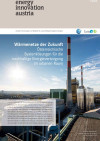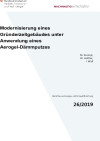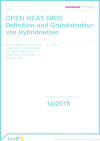Suchergebnisse für "Factsheet%3A Energietechnologien gestalten%2C die f%C3%BCr alle sinnvoll und nutzbar sind"
Smart Cities Summerschool - 4 Public Lectures
23., 25. und 27. August 2016
Wien (verschiedene Locations)
Im Rahmen der Summer School "Smart Cities – Designing Places & Urban Mentalities" öffnen vier Public Lectures der breiten Öffentlichkeit das Spannungsfeld zwischen interdisziplinärer Kooperation und wissenschaftlichem Austausch in den Bereichen Stadtplanung, Soziologie, technologiegetriebener Innovation und Informatik.
Wärmenetze der Zukunft

Konzepte und Technologien für eine nachhaltige Energieversorgung im urbanen Raum
energy innovation austria
1/2015
Herausgeber: BMVIT und Klima- und Energiefonds
Deutsch, 8 Seiten
Downloads zur Publikation
Exkursion zur seriellen Sanierung nach Erlangen
21. – 22. November 2024
Exkursionsziel: Erlangen, Deutschland
Erleben Sie serielles Sanieren live – mit fliegenden Fassaden und der Montage vor Ort.
Expertenforum Energiespeicher Beton
8. November 2017, 14.00 Uhr
TU Campus Getreidemarkt, TUtheSky, Getreidemarkt 9, 1060 Wien, 11. OG
Aktuelle Forschungsergebnisse und Praxiserfahrungen zu hohen erneuerbaren Deckungsanteilen in Verbindung mit thermischer Bauteilaktivierung.
Sanierungskonzept für das denkmalgeschützte Otto-Wagner-Areal zum Plus-Energie-Quartier
Im „Stadt der Zukunft“ Sondierungsprojekt „OttoWagner-ArealPlus“ wurde ein innovatives und gleichzeitig denkmalschutzverträgliches Sanierungskonzept zur Transformation des Wiener Otto Wagner-Areals in ein Plus-Energie-Quartier entwickelt. Das 50 Hektar Areal mit 63 Gebäuden und rund 175.000 m² BGF ist das weltweit größte zusammenhängende Jugendstil-Ensemble.
SRI - Smart Readiness Indikator für Gebäude
04. Oktober 2019
Großer Hörsaal Techgate, Giefinggasse 2, 1210 Wien, AT
Chancen und Herausforderungen für Gebäude der Zukunft
Reflexionsgespräch zur nationalen Bauforschung 2024-2027
Beim Reflexions-Workshop am 5. Juni 2023 erarbeiteten Vertreter:innen von Unternehmen, Forschung und Wissenschaft sowie Verbänden Inputs für zukünftige Forschungsthemen.
ABGESAGT: Baukongress 2020
23. - 24. April 2020
Austria Center Vienna
HINWEIS: Der internationale Baukongress wird auf Anfang 2021 verschoben.
SURO - Der städtische Untergrund als Rohstoffmine? Potential an Sekundärressourcen in der erdverlegten Infrastruktur
Machbarkeit eines Ressourcenkatasters zur Inventarisierung, Charakterisierung und Verortung der Materialbestände in den erdverlegten Infrastrukturnetzwerken österreichischer Stadtregionen. Das Ergebnis dient der ökonomischen Bewertung von Sekundärrohstoffpotenzialen.
Pressekonferenz zur Eröffnungsfeier von MUGLI
August - September 2018
Hauptbahnhof Wien
Der erste mobile Experimentierraum für Bauwerksbegrünung „MUGLI“ wurde am Wiener Hauptbahnhof eröffnet und ermöglicht es, Bauwerksbegrünung hautnah zu erleben.
Kostenloses Webinar: ICP Europe Training für Projektentwickler
18. Jänner 2017, 14:00 - 17:00 Uhr
Erfahren Sie wie Sie energieeffiziente Gebäudesanierungen nach den Best Practices der Industrie und in Konformität mit den ICP Protokollen entwickeln.
Sonderausstellung „Erneuerbare Energien“ in der SONNENWELT Großschönau
30. März 2017
Sonnenwelt Großschönau, NÖ
Was haben erneuerbare Energien mit jeder/jedem Einzelnen zu tun? Diese Frage stand im Mittelpunkt der feierlichen Eröffnung der neuen Sonderausstellung in der SONNENWELT Großschönau zum Thema „Erneuerbare Energien“ am 30. März 2017.
Modernisierung eines Gründerzeitgebäudes unter Anwendung eines Aerogel- Dämmputzes

In diesem Demonstrationsvorhaben wurde eine umfassende Modernisierung im gründerzeitlichen Gebäudebestand beispielgebend für die Randbedingungen einer regionalen Schutzzone umgesetzt. Durch die Anwendung des Aerogel- Hochleistungsdämmputzes wurde eine gründerzeitliche Fassadendämmung im Rahmen einer hocheffizienten, umfassenden Sanierung bei gleichzeitiger Erhaltung des Fassadenbildes umgesetzt.
Schriftenreihe
26/2019
M. Krempl, W. Hüttler, I. Wall
Herausgeber: BMVIT
Deutsch, 47 Seiten
Downloads zur Publikation
Smart Communities and Technologies
17. Oktober 2016, 13:30 – 18:30 Uhr
TU Wien, 1040 Wien, Karlsplatz 13 (Hauptgebäude)
Im Rahmen der Veranstaltung „Blickpunkt Forschung“ präsentieren TUW-ForscherInnen und ihre Unternehmenspartner anwendungsnahe Projekte zu den zukunftweisenden Themen in zwei Parallelsesssions.
PLAISIR - Planning Innovation: Lernen aus sozial innovativen Energieprojekten
PLAISIR analysiert sozial innovative Energieprojekte in strukturschwachen Regionen um deren Rolle in regionalen Energietransitionsprozessen zu verstehen und Empfehlungen für energieorientierte, endogene Regionalentwicklung formulieren zu können.
Internationale Passivhaustagung 2018
9. - 10. März 2018
München
Passivhaus - das lohnt sich! - So lautet der Slogan der 22. Internationalen Passivhaustagung. Der Schwerpunkt diesmal liegt auf der Vereinbarkeit von Effizienz und Wirtschaftlichkeit.
Digital Findet Stadt - Expert Talk II: Kreislaufwirtschaft & Digitalisierung
10. November 2020
Online
Im zweiten Teil der Webinarreihe "Digitalisierung als Enabler für nachhaltige Immobilien" liegt der Fokus auf Kreislaufwirtschaft & Digitalisierung in der Bau- und Immobilienwirtschaft.
Thementag Smart Cities beim Landinger Sommer
11. Juli 2019
Hösshalle, 4573 Hinterstoder
Im Sommer 2019 gibt es ihn wieder: den Smart Cities Thementag in Hinterstoder. Im inspirierenden Rahmen des Landinger Sommers möchten wir neue Smart City-Projekte und Entwicklungen kennenlernen, Strategien und Erfahrungen diskutieren sowie in nicht-alltäglichen Settings Lösungsansätze für anstehende Herausforderungen erarbeiten.
OPEN HEAT GRID - Offene Wärmenetze in urbanen Hybridsystemen

Primäres Forschungsthema von OPEN HEAT GRID war die Untersuchung der Möglichkeiten zur Forcierung der Einspeisung industrieller Abwärme in bestehende Fernwärmenetze.
Schriftenreihe
1/2018
Herausgeber: BMVIT
Deutsch
Downloads zur Publikation
IEA Vernetzungstreffen 2016: Urbane Energieinnovationen – Beitrag zur Energiewende
20. Oktober 2016, 09:00 - 17:00 Uhr
Modul, Peter Jordan Straße 78, 1190 Wien
Das IEA Vernetzungstreffen 2016 widmete sich dem Thema urbane Energieinnovationen und deren Beitrag zur Energiewende sowie den dafür relevanten Kooperationen in den IEA Technologieprogrammen.
